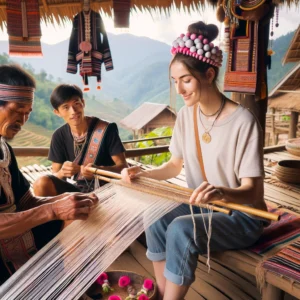Introduction
The hill tribes of Northern Thailand, with their rich cultural and ethnic diversity, are an integral part of the region’s heritage. Among them, the Karen, Hmong, Lisu, Akha, and Lahu tribes each boast unique customs, languages, and traditions, deeply intertwined with the natural landscapes they inhabit. This connection to nature is evident in their sustainable living practices and spiritual ties to the land, offering invaluable insights into harmonious coexistence with the environment.

The Cultural Mosaic of Northern Thailand’s Hill Tribes
The hill tribes of Northern Thailand present a vibrant cultural mosaic, celebrated through their traditional dress, agricultural practices, festivals, and crafts. These traditions, a testament to the tribes’ resilience, are crucial in preserving their heritage amidst the challenges of modernity. The social structures and belief systems within these communities guide their daily life and maintain the fabric of communal relations, showcasing a rich cultural legacy that continues to thrive today.
Sustainable Living and Environmental Stewardship
The hill tribes of Northern Thailand have long embodied principles of sustainable living, closely tied to their agricultural practices and reverence for the land. Traditional techniques such as rotational farming allow them to cultivate crops without depleting soil nutrients, maintaining ecological balance within their terraced fields. This deep-rooted understanding of the natural world showcases the tribes’ role as stewards of the region’s rich biodiversity, offering lessons in conservation and sustainability.

Challenges Facing the Hill Tribes Today
Despite their rich cultural heritage and sustainable practices, the hill tribes of Northern Thailand face numerous challenges. Issues such as land rights, access to education and healthcare, and the pressures of globalization pose significant threats to their traditional way of life. However, various initiatives aim to empower these communities, fostering cultural preservation and improving living standards while navigating the complexities of modernization.
Experiencing Hill Tribe Cultures Responsibly
Visiting hill tribe villages offers a unique insight into the rich cultural heritage of Northern Thailand. To ensure these encounters are respectful and beneficial, tourists are encouraged to engage in cultural exchange programs that prioritize learning and mutual respect. Activities like learning traditional weaving techniques from local artisans not only enrich the visitor’s experience but also support the preservation of these valuable skills.

The Impact of Ethical Tourism on Hill Tribe Communities
Ethical tourism practices play a crucial role in supporting the hill tribes of Northern Thailand. By choosing tours and experiences that respect the tribes’ cultures and contribute to their economies, visitors can have a positive impact. These interactions help to preserve the tribes’ traditions and promote sustainable development, ensuring that their rich cultural heritage continues to thrive.
Conclusion
The hill tribes of Northern Thailand offer a window into a world of rich traditions, sustainable lifestyles, and vibrant cultures. Engaging with these communities responsibly allows for a deeper understanding and appreciation of their way of life, emphasizing the importance of cultural preservation and sustainable tourism. As visitors, we have the opportunity to learn from and support these communities, fostering a more inclusive and respectful approach to cultural exploration.